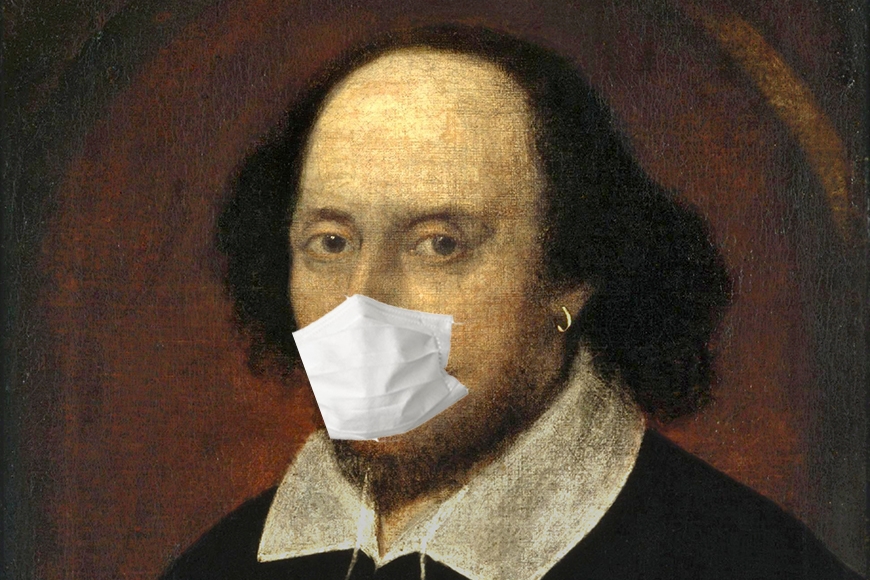Celebrating Shakespeare in a Pandemic
By Dr. Katherine Scheil
“A plague on both your houses,” the character of Mercutio famously remarks in Romeo and Juliet. Shakespeare was born during the month of April, 1564 in Stratford-upon-Avon, 456 years ago. Less than three months later, on July 11, the parish burial register recorded hic incepit pestis, here begins the plague. It is remarkable that Shakespeare survived to write the body of work that still enthralls the world: the plague reappeared on a regular basis throughout his life, with a survival rate of just over 50 percent.
The year of Shakespeare’s birth, over 200 people in the small town of Stratford died of the plague, and one family on the same street as the Shakespeares lost four of their children. William was the third child of John and Mary Shakespeare but the first to survive, though we don’t know the cause of his younger siblings’ deaths. Shakespeare’s only son Hamnet, who died in 1596 at age 11, may have perished in the plague. As many a current social media meme has noted, Shakespeare wrote King Lear (as well as the narrative poems Venus and Adonis and The Rape of Lucrece) while sheltering in place during surges of plague.
In The Year of Lear: Shakespeare in 1606, James Shapiro points out that by the summer of 1603, when Shakespeare was writing King Lear, London recorded more than 3,000 deaths a week, with a population of 200,000. The playhouses closed due to the plague, briefly reopening in April of 1604, only to close again for the rest of the year. In the outbreak of 1604, according to Shapiro, over 30,000 Londoners died, with another 30,000 infected but surviving. Shakespeare couldn’t resist having King Lear comment on the “plagues that hang in this pendulous air,” but the theater closings did allow Shakespeare extra writing time.
While our own playhouses have shuttered, there are still plenty of opportunities to get a Shakespeare fix.
- Maggie O’Farrell’s new novel Hamnet, recently nominated for the 2020 Women’s Prize for Fiction, imagines the story of Shakespeare’s mysterious only son, poignantly capturing the deep grief felt by Shakespeare and his wife Anne as they quickly bury their only son so as not to spread the plague.
- Interested in early modern medicine? John Hall was a physician in Stratford married to Shakespeare’s eldest daughter Susanna, and a new edition of his medical casebook has recently been published (prepared by the late Greg Wells and beautifully brought to print by Paul Edmondson). Hall no doubt treated Shakespeare himself, though he leaves his famous father-in-law out of his accounts. Hall describes Mrs. Bettes of Ludlow, age 50, who was “weighed down by severe cough and difficulty of breathing,” prescribing a treatment that included red roses, raisins without seeds, sugar candy, vitriol and sulphur, taken morning and evening. Mrs. Sadler, a 60-year old gentlewoman from Stratford, was prescribed an herbal remedy for similar symptoms. “She is very much relieved,” he recorded.
- A number of Shakespeare performances are newly available online and free for viewing. Shakespeare’s Globe Theatre in London offers a new play every fortnight. London’s National Theatre is broadcasting Twelfth Night, with Tamsin Greig as Malvolio. Brooklyn Academy of Music offers Goat Theatre’s reimagining of King Lear as a song cycle.
- If you prefer someone to read to you, actor Patrick Stewart is working his way through all of Shakespeare’s Sonnets on Twitter (@sirpatstew). Or hear from others at #SonnetADay.
- The Folger Shakespeare Library series of podcasts, Shakespeare Unlimited, lets you listen to the latest developments in Shakespeare studies, including a recent episode on the amazing discovery of John Milton’s own copy of Shakespeare’s works in the Free Library of Philadelphia. Another focuses on Elisabeth Kinsley’s recent book on immigrant Shakespeare in New York, detailing how immigrants on the Lower East Side staged Shakespeare’s plays in their own languages and adapted for their own cultures, sharing performance spaces, props, and costumes.
- For individual reading, or Zoom group reading, the Folger offers free downloadable copies of Shakespeare’s plays and poems. It is not too late to join Ian Doescher’s Shakespeare 2020 project, where thousands of people worldwide are reading through Shakespeare’s entire canon in a year. Doescher’s own William Shakespeare’s Star Wars Trilogy series offers another fun angle on the famous plays.
- Two recent books address the connections between Shakespeare and contemporary politics in America. James Shapiro’s Shakespeare for a Divided America looks at eight defining moments in American history to argue that “Americans of all stripes—presidents and activists, writers and soldiers—have turned to Shakespeare’s works to give voice to what could not readily or otherwise be said.” The final chapter focuses on the famous 2017 production of Julius Caesar at the Public Theatre in New York. In addition, Jeffrey R. Wilson’s Shakespeare and Trump uses a “Shakespearean intervention” to illuminate contemporary politics.
How to celebrate Shakespeare’s birthday?
The Everything to Everybody project, which is bringing the Shakespeare Memorial Library to new communities, has released 50 never before seen photographs in honor of Shakespeare’s birthday, including a photograph from Max Reinhardt’s 1935 film A Midsummer Night’s Dream featuring James Cagney as Bottom, the child-star Mickey Rooney, and Olivia de Havilland in her first Hollywood film. And the great Shakespeare scholar Sir Stanley Wells is delivering four lectures on Shakespeare, in honor of his own 90th birthday.
Or, you could start that long-delayed writing project that may become the next King Lear.
Katherine Scheil has published three books about Shakespeare: Imagining Shakespeare's Wife: The Afterlife of Anne Hathaway (Cambridge University Press, 2018); She Hath Been Reading: Women and Shakespeare Clubs in America (Cornell University Press, 2012); and The Taste of the Town: Shakespearian Comedy and the Early Eighteenth-Century Theatre (Bucknell University Press, 2003). She is currently involved with the international project Civic Shakespeare and is the American representative for the Everything to Everybody project.



